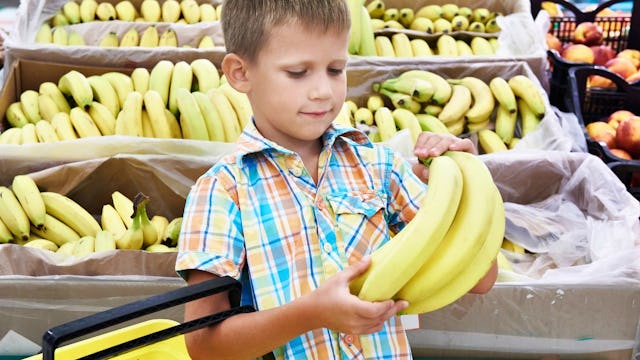Grocery Shopping Should Be The New Homework, And Here's Why

I sent my 9-year-old into the grocery store with $14 and a mission: Get things for your lunch that you will actually eat!
After weeks of lovingly packing the “perfect lunch” — only to have it come home untouched — I was done. I explained this to my son in very calm mom-speak while depositing uneaten lunch contents into the garbage.
Translation: I yelled over the kitchen counter while not-so-gently tossing his lunchbox into the sink.
Reflecting on our lunch debacle, I decided he could be part of the solution. With a quick lesson on tax per dollar (and rounding up to be on the safe side), we headed to the market, where he disappeared through the sliding doors, to fend for himself among the aisles of food.
I sat in the parking lot with a punchy 3-year-old, unfit for public errands of any sort, feeling pretty good about not having to actually leave the car. After 27 rounds of “Wheels on the Bus,” my son emerged, head held high and with a noticeable spring in his step.
Seriously, he was beaming.
Clutched in his arms (guess he didn’t want to splurge on a bag) was a loaf of sourdough bread, a package of sliced Swiss cheese (kosher and gluten-free?!), and a jar of pickles. Not three things I’d have chosen for him had I been the one doing the choosing.
As we headed home, he told me he had been super nervous. He had to ask where the bread was because he couldn’t find it. He wasn’t sure he had enough money — even though he’d kept track in his head. Everything hung in the balance until…checkout! Whew, he even got change back!
Our outing was not a deliberate “teachable moment.” It was an act of desperation, motivated by a selfish need to avoid public places of any kind during the witching hours of evening with my hungry preschooler (who’d be sure to cause a scene in front of someone we knew).
Regardless, it turned out to be a milestone for both of us.
He learned more than how to add up money and buy gluten-free sandwich items:
He learned he could be nervous, but still follow through.
He learned how to ask for help when he needed it. (Shout-out to the guy in aisle six who told my son where to locate the bread!)
He learned he could survive without me, even if he was scared and unsure.
Will he actually pull over and ask for directions one day? I guess with the advent of GPS, we’ll never truly know, but asking for help in the grocery store is encouraging.
Our excursion to the market taught me some things too:
He’s ready for more responsibility and independence.
He is more capable than I have allowed him to be.
After sitting with these warm, fuzzy feelings for all of 30 seconds, I promptly panicked and thought of all the everyday tasks he doesn’t know how to do, because mommy guilt.
He has so much to learn that has nothing to do with school.
News and social media are flooded with content about the emerging pushback on homework by parents and teachers. Our goal is the same: producing well-rounded kids who can function without us.
Without homework, teachers worry that kids will fall behind, miss opportunities for learning, and be unable to survive the rigor awaiting them in junior high and high school. With the bulk of their days spent at school, followed by more hours doing homework, parents wonder how we’ll prepare them for life beyond school.
Many of the skills and values I want to instill in my son, before he has to fend for himself in the real world, can’t be found in spelling lists or worksheets.
Nope. I have my own (no) homework list for my child:
Add value to your community. Volunteer at a local retirement home, animal shelter, or library. Have a lemonade stand. Meet your neighbors. Be kind. Think of circumstances beyond your own that you’d like to impact or change. Do it.
Participate in family. Help at home. Set the table, feed the pets, take out the garbage, play with your little brother, and read him stories. Ask, “How can I help?”
Exercise independence. Do things that give you a sense of accomplishment. Practice deciding. Get in your head and reflect. Choose your clothes. Make a snack. Ask questions and handle issues on your own when you can. I will give you space and trust to do this.
Play. With friends, siblings, the dog, by yourself. Just play. Do sports, learn instruments, listen to music, dance, sing, collect baseball cards. Go outside. Climb, jump, challenge your body. Play board games, paint, build, invent, cut out, take apart, glue.
Get messy.
Read. Books are your friend; they can take you anywhere. Remember this when you think you have nowhere to go or need a change of scenery.
Learn every day. Have an open mind. Ask questions. Listen. Observe. Notice. Think. Try new things. Look up words you don’t know. Find answers to questions you have.
Be curious.
In its simplest form, my list is lofty and loaded. And like my child who grows and changes daily, so will my list.
To my son’s teachers: While you prepare him to meet academic challenges and opportunities, I will be doing my best to ready him for the world he faces outside the classroom.
Thank you for being intentional about my child’s homework load so that I may attempt to weave in my own lessons in between — or maybe as part of — the 54 other to-dos that make up a day.
Meanwhile, I can be found in the parking lot, singing “Wheels on the Bus” out of the car window with my preschooler while my 9-year-old does the grocery shopping.